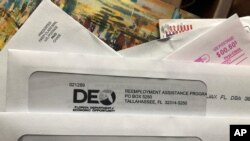U.S. unemployment compensation claims dropped sharply last week, the Labor Department reported Thursday, in what could signal improved economic conditions as the number of new coronavirus cases drops.
The government said 730,000 workers filed for benefits last week, down 111,000 from the revised figure of the previous week.
The U.S. economy is still facing headwinds as tens of thousands of people are still being infected daily by the coronavirus even though the number of new infections has dropped sharply in the last three weeks to below 100,000 a day from much higher figures in January.
About 1.5 million Americans are now being vaccinated each day against the virus, with the inoculations expected to extend for months.
Employers, however, are still confronted with orders from state and municipal officials to restrict business hours or limit the number of customers they can serve at any one time to try to prevent the spread of the virus.
For months now, the number of jobless benefit claims has remained above 700,000 a week, and above 800,000 and 900,00 in some weeks.
All the weekly totals in the last several months have been well below the 6.9 million record number of claims filed late last March as the pandemic took hold in the U.S. Still, all the weekly jobless benefit claim figures in the last 11 months have been above the highest pre-pandemic level in records going back to the 1960s.
Federal Reserve chair Jerome Powell this week said the U.S. economic recovery is “far from complete” and said the central bank will continue to buy $120 billion worth of bonds each month to foster bank lending and consumer spending.
Congress is also debating President Joe Biden’s proposed $1.9 trillion coronavirus relief measure, with passage possible in the next three weeks although many of the details remain unresolved.
The federal government has been making $300-a-week extra payments to the jobless on top of less generous state benefits, a stipend that will last till mid-March. Biden is trying to boost that stipend to $400 a week through September. Republicans want to keep the payments at $300 and end them sooner.
Biden has narrow majorities in both the Senate and House of Representatives, possibly easing approval of his relief plan, but only if Democrats vote as a bloc or the president, a Democrat, can convince some Republican lawmakers to support it.
The Democratic-controlled Congress has advanced procedural rules that would allow it to eventually approve the deal on a straight party-line vote if needed, without Republican support.
In the U.S., nearly 10 million of the 22 million workers who lost jobs in the pandemic remain unemployed. The jobless rate dipped to 6.3% in January, with many economists saying the figure could remain elevated for months.
U.S. employers have called back millions of workers who were laid off during business shutdowns in 2020. But some hard-hit businesses have been slow to ramp up operations again or have closed permanently, leaving workers idled or searching for new employment.
The U.S. has now recorded 505,000 coronavirus deaths and 28.3 million infections, both figures higher than that being reported in any other country, according to Johns Hopkins University.






